Text
dormant mode
Due to a general lack of time/energy, this blog is going to be inactive for a while. Weekly translations will continue (unless I decide to take a break, in which case there will be announcement at the end of the newest translated chapter), but commentary posts will be on hold.
I do hope to continue posting translator notes some day. Maybe after my translations catch up with the manhua? I should have more free time then.
26 notes
·
View notes
Photo

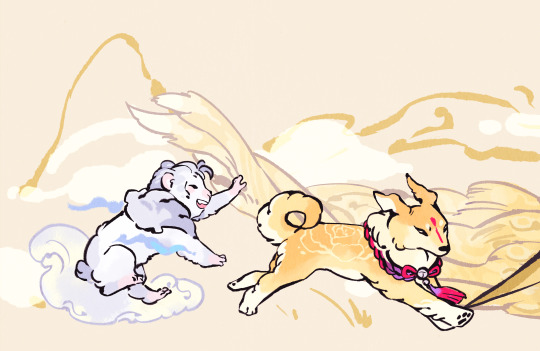

finally finished!!!
Row 3: LJY/monkey - JL/dog - JZX/chicken - JYL/pig
<< Row 1 | <<Row 2
2K notes
·
View notes
Photo

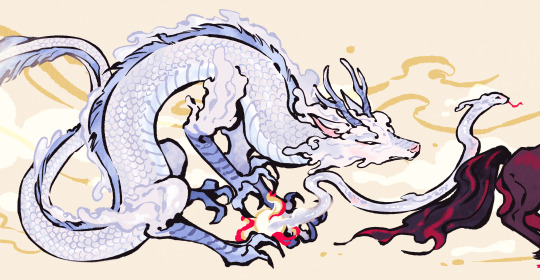
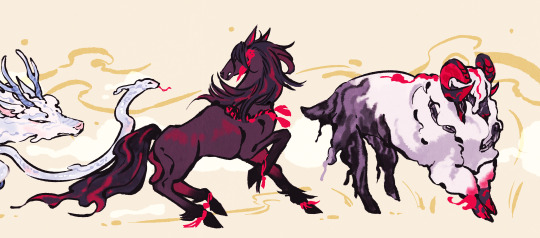
more Chinese Zodiac inspired MDZS art!
Row 2: LWJ/dragon - LSZ/snake - WWX/horse - WN/sheepgoat
<< Row 1 | Row 3 >>
3K notes
·
View notes
Photo

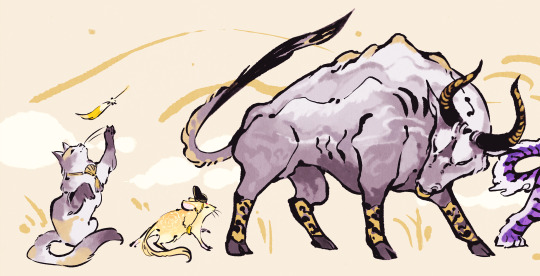
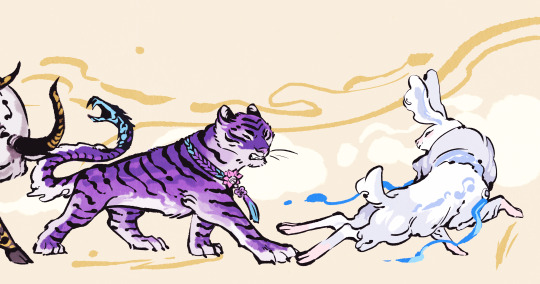
been wanting to do some Chinese Zodiac-inspired MDZS art!
will be doing them in rows of 4~
Row 1:
NHS/Cat - JGY/Mouse - NMJ/Ox - JC/Tiger - LXC/Rabbit
Row 2 >> | Row 3 >>
3K notes
·
View notes
Text
diyan vs. tiantong
So, there is this chengyu:
gǒu ná hào zi
狗拿耗子
dog catches rat
And it is just. So funny in the context of Diyan going all Inspector Javert on Tiantong.
The logic here is that catching rats is a cat’s job, so a dog going around doing the same is just sticking its nose where it doesn’t belong. A common extension of the idiom is
gǒu ná hào zi duō guǎn xián shì
狗拿耗子多管闲事
dog catches rat, so meddlesome
Or:
dogs who catch rats have way too much free time
Anyway I know it doesn’t quite match what’s actually going on in the story. But I think it’s fun to imagine this vision of Diyan, a weird annoying busybody who has absolutely nothing better to do, 吃饱了没事干
5 notes
·
View notes
Text
Zodiac: Twelve Souls — 32

< PREV | ARCHIVE | NEXT >
Steal Away
“How do you know my name? Who are you?”
news
— New translated chapter posted.
— The burn-out is real, ahaha. Time for a break. I will probably continue to blog/reblog things in the meantime, but the main project for Z12 translation will be on pause through December. Hoping to resume weekly updates afterwards. Take care of yourselves, everyone. See you all in the new year!
— Next update target: January 3, 2023
notes
— Who Bodu:
Hehe. Couldn’t help myself.
As an extra layer of bilingual humor, “who” sounds quite like 虎 (hǔ - tiger).
(And nah, there wasn’t originally a joke here. But so many jokes get lost in translation! I have to seize every chance to even the score!)
— Makes no sense:
Qitian’s original comment is shown below.
真是莫名其妙……
This really makes no sense…!
Tu Fei uses the same phrase when he learns Baxia’s name/nickname way back in Chapter 3:
真是个莫名其妙的名字
What an indescribable name.
As you can likely guess, this idiom is used to describe something baffling or inexplicable. A more literal interpretation might be something like:
mò míng qí miào
莫名其妙
unable to express its profound mystery
— People below / those below:
A pretty literal translation of 底下(的)人.
Lichong likely uses this phrase to refer to subordinates/underlings; i.e., those below [on the hierarchy].
< PREV | ARCHIVE | NEXT >
1 note
·
View note
Photo

Sketchy doodle of scratch cat brat
1 note
·
View note
Text
Zodiac: Twelve Souls — 31

< PREV | ARCHIVE | NEXT >
Draw
“All that excitement over nothing…”
news
— New translated chapter posted.
— Thinking of taking a break after next week’s chapter. I will write a note if I do.
— Next update target: November 29, 2022
notes
— Draw:
From 和局 (hé jú). Draw as in “tie”: The game ended in a draw.
— Lead, clue, etc.:
Quan Diyan often uses 线索 (xiàn suǒ) to refer to things. Among these include the green scale he took from Wuchang, the message that Shiye intercepted in Year of the Hen, and Wuchang herself.
线 + 索 — Literally, thread/string/wire/line + cable/cord/rope/chain. The term evokes a sense of following a thread to see where it leads. I alternately translate this as clue or lead or thread, depending on how natural it feels in English. For example, a person typically isn’t referred to as a clue, but may be considered a lead.
— All hail:
From 参见 (cān jiàn). An expression used when paying one’s respects. I’ve also translated this term as salutations in the past. See:
Chapter 0.12 (Year of the Pig):
猴兵:参见山君……
Monkey soldiers: All hail the Mountain Lord…
Chapter 18 (Depart):
马不凡:参见牛族长
Ma Bufan: Salutations to the leader of the Ox Clan.
Chapter 31 (Draw):
参见畜王!
All hail the King of Chu!
Definition-wise, “all hail” is pretty appropriate since it is meant to be a general respectful greeting.
Context-wise, the way I tend to see “all hail” used in contemporary media is towards sovereign authority figures, especially when the all-hailer is a subject of that figure. So it feels weird to me, on an instinctive level, to have Ma Bufan say, “All hail the leader of the Ox Clan” — even though it is quite appropriate!
— It’s the absolute truth:
From:
qiān zhēn wàn què
千真万确
A thousand truths, ten-thousand certainties.
< PREV | ARCHIVE | NEXT >
#生肖十二魂#twelvesouls#manhua translation#quan diyan#wuchang#ji shiye#mountain lord#ma bufan#ox clan leader#king of chu#chengyu
0 notes
Text
Random Stuff #11: Written Language-Based Divination--Chaizi (拆字)
There were many styles of divination in ancient Chinese history, the most famous of which were the oracle bones, which were (usually) turtle shells on which questions were inscribed, and then burned over a fire until the shell cracked, and the cracks were interpreted as the answers to the questions.
However, today’s subject is a form of divination based entirely on written language: chaizi/拆字. Chaizi basically means “deconstructing (Chinese) characters”, and can also be called pozi/破字 (lit. “breaking characters) or xiangzi/相字 (lit. “judging characters”) or cezi/测字 (lit. “measuring characters”). How it works is pretty simple: the diviner will look at the structure of characters in your given name or in a character you gave at random, and try to interpret your future from those characters.
For example, there was once a guy who was about to enter the civil service examinations (keju/科举; exams in the imperial era designed to test one’s merit, and if one ranks high enough, one can become a government official). He went to a diviner named Xie Shi (谢石), who was good at chaizi divination, and asked about his future for fun. He gave Xie Shi the character 乃. Xie Shi then told him he will never rank high enough in the exams, because ranking high enough in the exams is called jidi/及第, and the character he gave, 乃, is an “incomplete form” of 及. This story is from Miscellaneous Records of the Scholarly Halls (《玉堂杂记》) by Zhou Bida (周必大) in Southern Song dynasty (12th-13th century).
In old times, chaizi can also be played as a game, and this is sometimes called chaibaidaozi/拆白道字. A couplet from Qing dynasty (written in late 18th-early 19th century) contained the phrase “ 谢金圃, 抽身便讨; 吴玉纶 倒口就吞”. In the first part, 谢 is the character being deconstructed. 谢 can be deconstructed into 3 parts: 讠, 身, 寸. So the poet wrote “抽身便讨”, or “take away the 身 in the middle and you will have 讨”. In the second part, 吴 is the character being deconstructed. 吴 is composed of the characters 口 and 天, with the former on top of the latter, but if you flip these two, the character become 吞/swallow. So the poet wrote “倒口就吞”, or “flip the 口 and there’s 吞”.
In modern times, chaizi is still used online, but instead of for divination or for fun, it’s actually used as a way to add emphasis (only applicable for characters that can be deconstructed into right and left parts), similar to typing in all caps in English, since separating the elements of a character makes it appear bigger. An example is the character 强/strong, which becomes bigger if deconstructed and typed out separately as 弓虽.
Another less popular way chaizi is used online is to conceal one’s true identity. For example my blog name, “ten days of rain”, is a shortened version of “text predicting ten days of rain”, or “文卜十日雨”, which is a deconstructed and scrambled version of my real given name (last name not included). Can you guess what my real name is? Hint: it’s only two characters.
192 notes
·
View notes
Text
Zodiac: Twelve Souls — 30

< PREV | ARCHIVE | NEXT >
Counterplay
“Come quietly! You have already lost!”
news
— New translated chapter posted.
— Thanks again to Reacien for helping with the raws and cleaning.
— Next update target: November 22, 2022
notes
— Counterplay:
From 解杀还杀 (jiě shā huán shā).
Another xiangqi-specific term! This is referring to a “turn the tables” sort of maneuver. A xiangqi player who resolves a threat (解杀) while simultaneously issuing a threat of their own (还杀) would be engaging in 解杀还杀.
— Come quietly:
From 束手就擒 (shù shǒu jiù qín). A more literal interpretation might be something like: hands tied, be captured. Quan Diyan is telling Tiantong to stop resisting and let himself be arrested.
— Xun above, gen below:
Prior to this chapter, Tiantong has invoked the Eight Pure Hexagrams in many of his techniques. This chapter marks the first appearance of a “non-pure” hexagram — that is, a hexagram comprised of two different trigrams, rather than two identical trigrams.
The exact hexagram in question is 漸 (jiàn). It is comprised of a wind trigram (xun above) on top of a mountain trigram (gen below).
☴ (巽 - xùn)
☶ (艮 - gèn)
䷴ (漸 - jiàn)
The name of this hexagram means gradual, in the sense of gradual progress. Perseverance and steady development. A slow-growing tree upon a mountain. It is actually quite a gentle hexagram, which strikes a hilarious contrast against Tiantong’s dramatic display this chapter.
< PREV | ARCHIVE | NEXT >
0 notes
Text
reports of their update frequency have been greatly exaggerated
Or: one of my funniest mistranslations yet. (Rest assured that this does not impact the story in any way.)
In the post-chapter extras of Year of the Pig, the creators discuss their planned update schedule. Early readers may recall that I translated this as “three chapters a week”, which is... ludicrously often, and makes zero sense given the timestamps in the official chapter archives. Like, what kind of broken space-time nonsense is this?
Here is the exact phrase in question.
每周三更新
Where I went wrong is that I read this as
每周,三更新
every week, three updates
instead of
每周三,更新
every Wednesday, update
The truth revealed! The creators were actually targeting weekly updates on Wednesdays (the third day of the week), not three updates per week.
Anyway, this is now corrected. And archived lovingly as a reminder not to blindly trust translations — and especially not mine!
0 notes
Text
Zodiac: Twelve Souls — 29

< PREV | ARCHIVE | NEXT >
Finishing Move
“Stop!!”
news
— New translated chapter posted.
— Thanks again to Reacien for helping with the raws and cleaning.
— Next update target: November 15, 2022
notes
— No notes for now.
Chapter was mostly action and sound effects, so not much to say here.
< PREV | ARCHIVE | NEXT >
0 notes
Text
Zodiac: Twelve Souls — 28

< PREV | ARCHIVE | NEXT >
Bad Move
“Step aside!!”
news
— New translated chapter posted.
— Thanks again to Reacien for helping with the raws and cleaning.
— Next update target: N/A
notes
— Yemozi
From 夜磨子 (yè mó zi). Another name for a rat.
夜 (yè): Night, evening.
磨 (mó): Mill, millstone. To grind, to polish.
子 (zi / zǐ): First of the Twelve Earthly Branches, associated with the Rat of the Chinese zodiac. This character is also commonly used as a suffix for nouns. (i.e., 磨子 = mill, millstone)
< PREV | ARCHIVE | NEXT >
0 notes
Text
Zodiac: Twelve Souls — 27

< PREV | ARCHIVE | NEXT >
Pinned
Close combat does me no favors. I’ll need to pull some distance.
news
— New translated chapter posted.
— Thanks again to Reacien for helping with the raws and cleaning.
— Next update target: November 1, 2022
notes
— Pinned:
From 欠行 (qiàn xíng).
欠行 refers to a xiangqi checkmate maneuver. The literal meaning is something like lacking movement, referring to how it prevents the general from being able to make any moves. A 闷宫将 (if you recall the Chapter 25 notes) is a specific type of 欠行.
What one might think of as stalemates and checkmates in international chess both appear to fall under 欠行. (Note: unlike international chess, xiangqi can be won via stalemate.) The reason why I did not use stalemate or checkmate or something similar for the title:
1. “Stalemate” and “checkmate” both imply the end of a game. Yet the match goes on. There are still quite a few xiangqi-themed chapters ahead of us, people.
2. I really like how “pinned” emphasizes the inability to move. I also think it is a good stylistic fit, considering the fighting style of Ji Shiye (who features a lot in this chapter).
“Pinning” is a real chess strategy that focuses on limiting the movement of your opponent’s pieces. The major difference is that the king cannot be pinned; whereas 欠行 seems to exclusively apply to the king-equivalent (the general) in xiangqi. So they are kind of opposites in terms of technical meaning. And I chose to use it as a translation anyway. Language sure is weird!
< PREV | ARCHIVE | NEXT >
0 notes
Text

One of my favorite minor bits of worldbuilding is the use of floatstones to offset weight for easier conveyance of goods. It’s such a neat detail!
0 notes
Text
yellow (crazy rich asians)
Breaking away from gufeng for like four minutes to offer an English version of a Chinese cover of a Chinese version of an English song.
One math lady meme later — um, isn’t that just the original English song? What is this, a game of Google Translate Telephone?
Not so. See, the Chinese Mandarin cover of “Yellow” in Crazy Rich Asians (2018) uses lyrics from 流星 (Shooting Stars) by 郑钧 (Zheng Jun). Though the melody follows “Yellow” by Coldplay, the meaning is quite different, and lovely enough that I feel it worth trying to express back in English.
Somewhat ironically, the color yellow never comes up here. (Well, I guess there’s 黄昏, but that gets flattened into dusk in translation.)
Lyrics below the cut!
Notes:
Based on the Katherine Ho version
Lyrics are matched syllable-to-syllable
Part of my pseudotranslation series. Not intended as a rigorous translation. My primary motivation is not linguistic precision, but something far more nefarious: karaoke
Winds refers to the weather phenomenon and should be pronounced as such
Archived on AO3
- - -
流星 / shooting stars
Vocalist: Katherine Ho - 何光玥
Lyricist: Zheng Jun - 郑钧
Arranger: Brian Tyler
Katherine Ho version: [ link ] [ link ]
Zheng Jun version: [ link ] [ link ]
Original piece “Yellow” by Coldplay.
English lyrics (below): yuangler - 鱼安
- - -
LYRICS
我想知道
流星能飞多久
它的美丽是否
值得��寻求
I want to know
How long the stars can fly
Chase beauty through the sky—
Is it worth a try?
夜空的花
散落在你身后
幸福了我很久
值得去等候
The evening blooms
Behind you, they alight
They’ve brought me much delight
It is worth the time
于是我心狂奔
从黄昏到清晨
不能再承受(哦哦)
And so my heart beats fast
From dusk to dawn it lasts
’Til I might just die (just might)
情愿
坠落在你手中
羽化
成黑夜的彩虹
蜕变
成月光的清风
成月光的清风
Descend
In your hands I would go
Ascend
To rainbows in the gloam
Turn in-
-to moonlit winds aglow
To moonlit winds aglow
幸福
跳进你的河流
一直游到尽头
跳进你的河
Into
The galaxies of you
A joyous rendezvous
Swim all the way through
[ Repeat x3 ]
幸福
(幸福 跳进你河)
跳进你的河流
(幸福 跳进你河)
一直游到尽头
(幸福 跳进你——)
跳进你——
——的河
Into
(Swim through, swim through the stars)
The galaxies of you
(Swim through, swim through the stars)
A joyous rendezvous
(Swim through, swim all the—)
Swim all the—
—way through
我想知道
流星能飞多久
它的美丽是否
I want to know
How long the stars can fly
Chase beauty through the sky
- - -
note - on the galaxies
OK, so I am trying not to make a habit of explaining my translation choices on fun pseudotranslation projects that already take too many creative liberties.
But I feel very strongly about this hyperspecific thing!
I really want to talk about it!
Here is the deal. For this version of “Yellow”, every English interpretation I’ve seen translates 河流 into “river”, which... isn’t wrong! It is quite correct. The problem with this rendering is that it smothers a lot of context.
See, what is known as the Milky Way in English is often called the Silver River (银河) in Chinese. “Shooting Stars” (流星) more literally means flowing current of stars in Chinese. You may notice that these two terms each share a character with the aforementioned “river” (河流), which is not an accident. Culturally, stars are associated with rivers!
Meanwhile, English doesn’t really come with the same cultural associations, so translating 河流 as river is probably just going to confuse people. Like: hey, the entire song is packed with star/night motifs, the title itself is “Shooting Stars” — what’s with the weird and sudden river/swimming metaphors? Well, it’s all the same metaphor in Chinese. It’s only mixed-up in English!
Hence my choice of using galaxies instead of rivers. To me, it makes the song feel much more cohesive. (I also like how galaxies sounds like galax-seas. Stealth water pun!)
0 notes
